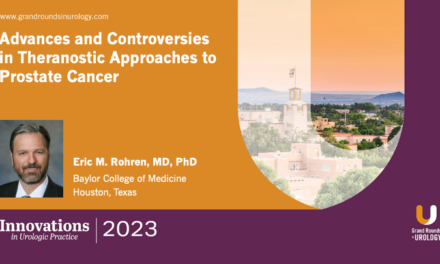
PCa Commentary | Volume 159 – November 2021
Posted by Edward Weber | November 2021
GENE EXPRESSION PROFILING: Application of Genomics to Therapy Selection for Patients with Metastatic Hormone-Sensitive Prostate Cancer (mHSPC).
mHSPC: Genomic basis for choice of therapy for men diagnosed with metastatic cancer prior to initial treatment.
Decisions regarding therapy for men with mHSPC will become an increasingly relevant issue as the use of 68Ga-PSMA-PET/CT and the newly approved Pylarify PET/CT take their appropriate roles in the initial staging of men newly diagnosed with unfavorable-risk intermediate and high-risk cancer. The October PCa Commentary summarized that triple therapy (ADT/docetaxel/abiraterone) yielded a significant benefit of a 2.5 year postponement of metastases compared to ADT/docetaxel—albeit a benefit achieved with greater toxicity. In a pivotal trial (CHAARTED) studying treatment of this stage of disease, men were stratified on the basis of fewer than four sites of metastases vs > 4, a criterion based on conventional imaging, i.e., CT and technetium bone scans.
Improvement in patient selection is moving toward choosing treatment on the basis of gene expression profiling. This technique captures the molecular heterogeneity of tumors that underlies disparate clinical behaviors and does so with greater fidelity than the standard clinics-pathologic risk groups, i.e., low-, intermediate- and high-risk. A recent study by Hamid, Spratt, et al. is a prime example. (Annals of Oncology June 2021)
The aim of their research was to identify molecular biomarkers that predict which men with mHSPC would benefit from intense double or triple therapy and, conversely, who could be spared the increased toxicity of combined drug treatment and benefit from ADT alone. They focused on transcriptional profiling of prostatectomy specimens or biopsies of metastases. Their analysis was based on three molecular biomarkers and related the findings to clinical outcomes of treatment with ADT/docetaxel vs. ADT alone. They used the data and specimens already collected in the CHAARTED trial for their analysis.
Three Molecular Profiles and How Each Affects Response to Therapy – A Bit of Biology.
1. The glands of the prostate are bi-layered with acinar cells (luminal A and B) facing inward mounted upon the outer basal cell layer. Each of the three subtypes has a distinct molecule profile and biologic behavior. In a cancer, one subtype or another may predominate. An analytic tool, PAM50, can identify the genomic signatures of each subtype and can indicate the relative presence of each in prostate cancer tissue.
Clinical significance: Hamid et al. found that the luminal B subtype was associated with poorer prognosis on ADT alone but benefited significantly from ADT + docetaxel. In contrast, the basal subtype showed no overall survival benefit with chemotherapy.
2. The androgen receptor within the prostate cell is the target for testosterone and DHT and when linked with these androgens promotes transcriptional activity in a multitude of “androgen response genes” (one example: the gene for PSA). The sum of activation of nine of these canonical genes in tumor DNA was quantified as ‘low’ or ‘average,’ and expressed as an ‘AR-A’ score.
Clinical significance: Patients with luminal B subtype and high AR-A scores are “predicted to have a greater sensitivity to taxane chemotherapy compared with basal and low-AR-A subtypes.”
3. The third analytic tool was the commercially available and abundantly validated gene expression profiler Decipher. This panel interrogates cancer tissue for the activity of 22 genes each either conferring tumor aggressiveness or tumor suppression. On a continuous scale of 0 to 1.0, Decipher predicts the risk of metastases within 5 and 10 years.
Clinical significance: “Higher Decipher risk was associated with greater improvement in overall survival with ADT + docetaxel.” (ibid) In this study, Decipher score was subdivided into three groups: 0 to 0.6, low; 0.6 to 0.835, intermediate; and high 0.835 to 1.0. Although all groups benefited from docetaxel, some benefited more than others. Three-year survival for men in the groupings was 77%, 60%, and 31% respectively. The absolute benefit of the addition of docetaxel for men in the lowest Decipher group was 9% vs. an absolute benefit of 25% for the highest group.
mHSPC Has Been Studied in Large Randomized Trials in the Past Five Years:
As described above, Hamid et al. applied their profiling method to the CHARTED data, and plan to analyze data from other major trials, for the purpose of estimating the balance of benefit vs. adverse effects and the relative gain accrued by more intense therapy. There have been at least six major trials of combination therapy for men with mHSPC combining one or two drugs compared to ADT alone that merit study: CHAARTED (added docetaxel), TITAN (apalutamide), STAMPEDE (abiraterone or docetaxel), PEACE-1 (docetaxel + abiraterone), ARCHES (enzalutamide), and LATITUDE (abiraterone). All showed a benefit from combined therapy at the price of side effects.
In the Titan trial, for example, at 4-year follow up the OS for ADT alone was 52.2 months whereas OS for apalutamide/ADT had not been reached (a 48% reduction of risk of death); time to castration resistance was 11.4 months for ADT alone vs. ‘not reached’ for the combination, a 66% reduction. Apalutamide is associated with rash, ~25%, and hypothyroidism, ~8%.
Hamid (ibid) stated that classification based on ARA-A score and histologic subtypes (i.e., luminal B or basal) needs verification before clinical application. In their opinion, however, the validated classifier Decipher “remains unoptimized” in mHSPC and already can provide valuable insight and prognostic value.
BOTTOM LINE:
Gene expression classifiers are being developed to aid precision decision making in therapeutic choices based on the relative balance of benefit vs. adverse effects.
Your comments and requests for information on a specific topic are welcome e-mail ecweber@nwlink.com.
Please also visit https://prostatecancerfree.org/prostate-cancer-news for a selection of past issues of the PCa Commentary covering a variety of topics.
“I want to thank Dawn Scott, Staffperson, Tumor Institute Radiation Oncology Group, and Mike Scully, Librarian, Swedish Medical Center for their unfailing, timely, and resourceful support of the Commentary project. Without their help this Commentary would not be possible.”
ABOUT THE AUTHOR
Edward Weber, MD, is a retired medical oncologist living in Seattle, Washington. He was born and raised in a suburb of Reading, Pennsylvania. After graduating from Princeton University in 1956 with a BA in History, Dr. Weber attended medical school at the University of Pennsylvania. His internship training took place at the University of Vermont in Burlington.
A tour of service as a Naval Flight Surgeon positioned him on Whidbey Island, Washington, and this introduction to the Pacific Northwest ultimately proved irresistible. Following naval service, he received postgraduate training in internal medicine in Philadelphia at the Pennsylvania Hospital and then pursued a fellowship in hematology and oncology at the University of Washington.
His career in medical oncology was at the Tumor Institute of the Swedish Hospital in Seattle where his practice focused largely on the treatment of patients experiencing lung, breast, colon, and genitourinary cancer and malignant lymphoma.
Toward the end of his career, he developed a particular concentration on the treatment of prostate cancer. Since retirement in 2002, he has authored the PCa Commentary, published by the Prostate Cancer Treatment Research Foundation, an analysis of new developments in the prostate cancer field with essays discussing and evaluating treatment management options in this disease. He is a regular speaker at various prostate cancer support groups around Seattle.



